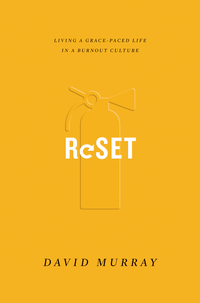 We have been pointing you to a new book from local author David Murray (Puritan Reformed Seminary) published by Crossway – Reset: Living a Grace-Paced Life in a Burnout Culture (2017). It is written with men especially in view, men in danger of burnout, as the title intimates.
We have been pointing you to a new book from local author David Murray (Puritan Reformed Seminary) published by Crossway – Reset: Living a Grace-Paced Life in a Burnout Culture (2017). It is written with men especially in view, men in danger of burnout, as the title intimates.
After chapters on doing a “reality check” (repair bay 1) and performing a “review” of our lives (repair bay 2), Murray takes us into repair bay 3, where he taught us the practical importance of sleep (“Rest).
Now in chapter four he has us take the “car” of our lives and pull into “repair bay 4”, which he titles “Re-create.” This is a chapter about taking care of our bodies, not now in terms of sleep and rest but in terms of proper diet and exercise. But he starts once again with a “body theology,” which is a brief exposition of 1 Corinthians 6:9-20. Part of that includes this:
Your body is for the Lord (vv.13-14). The apostle replaces a false slogan the Corinthians were using to abuse their bodies – ‘foods for the stomach and the stomach for foods’ – with a true slogan to bless their bodies: ‘The body is… for the Lord, and the Lord for the body.’
‘The body is for the Lord.’ God has given each of us a body to give back to him. He did not give us a body so that we can give it to anybody and everybody in immoral sexual relations. He did not give us a body so that we can give it to overwork or sloth. He gave us a body to give back to him. The body is for the Lord.
‘The Lord is for the body.’ He made it , cares for it, and maintains an eternal interest in it. He even took on a body, suffered in a body, and rose again in a body. he has a body to this day. The Lord is for the body. This is not of minor importance. Our future resurrection shows how much honor God puts on the body and how much we should honor in the meantime what he will honor for all time [p.75].
And then Murray goes on to apply this “body theology” with subjects such as “stand up (on posture and care for our backs),” “exercise,” and “manual labor.” Let me take a snippet from the section on exercise for our benefit, men.
Moderate physical exercise helps to expel unhelpful chemicals from our systems and stimulates the production of helpful chemicals. It strengthens not just the body but also the brain. Research has shown that walking just two miles a day reduces the risk of cognitive decline and dementia by 60 percent. And aside from the long-term benefits, exercise triggers the growth of new brain cells in the hippcampus and the release of neurotrophic growth factors – a kind of mental fertilizer that helps the brain grow, maintain new connections, and stay healthy. Exercise and proper rest patterns generate about a 20 percent energy in crease in an average day, while exercising three to five times a week is about as effective as antidepressants for mild to moderate depression [pp.78-79].
Good thoughts for us in the middle of the work week. Life is busy. Work is demanding. Time is elusive. But our bodies are the Lord’s, bought with a precious price. What are we doing to care for them the way He wills?